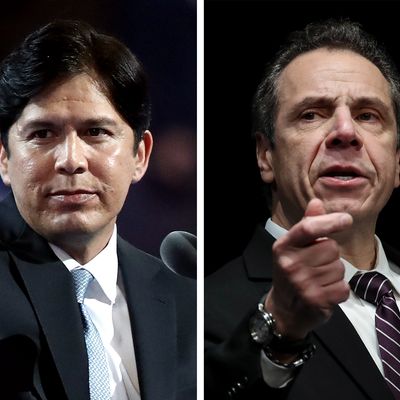
Last week at the behest of Governor Andrew Cuomo, the rupture between the progressive Working Families Party and progressive unions intensified, with two powerful SEIU and CWA locals withdrawing support for the WFP on the eve of its endorsement of Cuomo rival Cynthia Nixon. The action dramatized the lengths to which the labor movement in New York will go to stay on good terms with Cuomo, whose record has mixed important progressive accomplishments with centrist politics that most unions dislike.
At about the same time, interestingly enough, the California affiliate of the AFL-CIO has displayed its independence from the Democratic political establishment by endorsing state senate leader Kevin de León’s insurgent campaign against veteran U.S. senator Dianne Feinstein. Since it required a two-thirds vote of delegates to its state convention, the California Labor Federation’s backing of de León was a self-conscious protest against Feinstein’s habitually centrist instincts, and a sign of a strong leftward breeze in Golden State politics (the CLF also endorsed gubernatorial front-runner, Lieutenant Governor Gavin Newsom, who has carved out a strong progressive profile in his latest campaign).
On paper, de León is a more conventional candidate than Cynthia Nixon: He is, after all, a party legislative leader, not an “outsider” activist and celebrity like the Sex and the City star. But he’s as big an underdog as Nixon. The most recent major public poll in California showed him trailing Feinstein by a 42-16 margin, with two-thirds of self-identified Democrats supporting the incumbent. Worse yet, de León is struggling to raise the massive amount of money needed for a viable California statewide campaign; Feinstein presently has an astounding 20-1 lead in cash on hand.
But as the veteran observer of California progressive politics Harold Meyerson observes, there are a couple of explanations for the gap in the audacity levels being shown by New York and California unions.
To some extent, it reflects the two states’ electoral systems and the lay of the land in the Feinstein-de León and Cuomo-Nixon competitions. There are no viable Republicans running in the California Senate race, so thanks to the the state’s top-two primary system, the two Democrats will face each other both in the June primary and again in the November general election. That gives de León a lot more time (theoretically) to catch up with Feinstein. But more importantly, there’s no risk of Democrats losing the seat. While it’s unlikely Nixon would continue to campaign against Cuomo if he defeats her in the Democratic gubernatorial primary in September, there’s a chance she’d continue to use her WFP ballot line to go after the incumbent and provide an opening for some yet-to-be-identified strong GOP candidate.
Meyerson argues, however, that the most important difference between the two challenges to the status quo and how unions perceive them involves the personalities of the incumbents:
California labor may not be entranced by Feinstein, but neither they nor anyone else fear her. Cuomo, by contrast, governs by fear. As his war on New York’s Mayor Bill de Blasio and his betrayal and harassment of the WFP make clear, he seeks to stamp out any rival or potential rival, even when he could turn them into occasional allies. That made all too credible his threats to cast the unions that already support him out into the cold unless they cut off their support for groups that backed Nixon in the Democratic primary.
Personalities aside, Cuomo is a governor with the power (as well as the willingness) to confer tangible benefits on his friends and make life difficult for his enemies. Dianne Feinstein is just one of a 100 bloviators in the Senate. But Meyerson believes that the very traits that make Nixon’s description of Cuomo as “Andrew the Bully” effective have succeeded in keeping labor in his camp. Indeed, he compares the New York governor to the title character in the satirical film The Death of Stalin, in which the dictator paralyzed his subjects in fear even as he lay dying:
I’m not equating Cuomo to Stalin, at least when it comes to the substance of their policies and their methods of enforcing them. But the paranoia and vindictiveness of the man on the Kremlin floor and the man in Albany’s governor’s mansion have inspired fear and insecurity not just among their critics but among their supporters as well.
That’s why, for all the buzz about Nixon, it would be foolish to bet against Cuomo’s success this year. But if Cuomo ever falls from power, a lot of the people currently supporting his reelection will abandon him like a broken-down subway car.






























